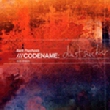|
|

Bark Psychosis Codename: Dustsucker is deliberately overwhelming, its every moment imbued with pure, aching intent. It's not to be taken lightly, nor the kind of music to put on in the background: you step into it consciously, completely. Having read interviews with Graham Sutton I get the impression that he has agonized over every moment of music he has ever released, and it shows. He's been working on this album since 1999, and has overseen all the artwork. Thank god there are some artists out there who care about the overall experience of their releases. This is a unique nocturnal soundworld, crackling and gaping at the edges, dragging light into black holes. There's a process of continual seepage and transformation, breath interweaving with the hum of amps, the brush of drums, the shimmer of vibraphone. A tension exists between the beauty of the organic sound and the 'industrial' feel of eerie perfection on the edge of breakdown, machines turning out mutant versions of their blueprints, rust and frost coating metal surfaces. The warmth of working bodies and machinery; the cold of the night air. The fact that Chris Morris used 'Pendulum Man' from Hex on his terrifying TV series Jam gives some kind of clue to the kind of atmosphere Sutton creates. (There's an answering-machine message at the start of penultimate track "Shapeshifting" alluding to the Brass Eye episode about drugs: "What are you doing? Playing on your Shatner's Bassoon?") Morris holds up warped examples of humanity as a warning against permanently metamorphosing into our potential darker sides; Sutton's gorgeous, ominous music makes us feel at home in the fucked-up world we have created, yet reaches towards beauty and redemption through painstaking transformation of the present. Opener "From What Is Said To When It's Read" is reminiscent of "Sunflower" by slowcore legends Low, which is a wonderful thing. Four chords, some gloopy wah-wah, resonant percussion from Lee Harris (Talk Talk), and Sutton's resigned whisper build slowly before shimmering arpeggios and a tambourine carry the track higher. After disintegrating into a middle eight, the song blasts towards a climax with a gloriously overdriven guitar - and then falls apart completely. Each track seems on the border of chaos, the tension created by the repetition of subtle and complex figures. Lee Harris's drumming is awesome throughout, his metronome-perfect playing and nuanced brushwork cutting through the lurching bass, stinging electric, and random electronic undertow. The inclusion of vocalist Anja Buechele lightens the musical palette and lends a welcome contrast to Sutton's weary delivery. Her co-written song "400 Winters" is probably the most accessible track here, built around a wistful acoustic guitar strum and pitchshifted vibraphone. Later, Anja reappears on "Shapeshifting", which is a gorgeously balanced song - until a spastic guitar solo drags the song down into the industrial crusher. Along with "From What Is Said..." it stood out for me on the first few listens. Tracks like "Miss Abuse" and "Burning the City" are more familiar Bark Psychosis territory, with shades of Hex alchemy at work. Sutton's vocals are more prominent in the mix and the sparing way the instruments are deployed lends these songs a more spacious feel. This contrasts with more shadowy, dense passages such as "INQB8TR", or the fizzing instrumental track "Dr Innocuous/Ketamoid". Closer "Rose" works in much the same way as "Pendulum Man" on Hex, bringing the album down into a soft-focus, pillowy haze. The Middle-Eastern sounding acoustic guitar fades away amidst warm strings, vinyl crackle and sparkling synth bleeps, Sutton's trademark production style ensuring a seamless drift into the clouds. Much like Hex before it, The For Carnation's eponymous album, or Laughing Stock by Talk Talk, this is an album best appreciated as a whole. It's the perfect length and the songs are superb, each one complementary and rich in atmosphere. There's plenty to explore in this densely-textured music; subtle shades flare, fade and recede. Perpetually on the edge of violence, destruction and despair, these beautiful industrial hymns sing from the blinding white core of human experience. Copyright © 2004 Tim Clarke
|
| © 2011 Luna Kafé |